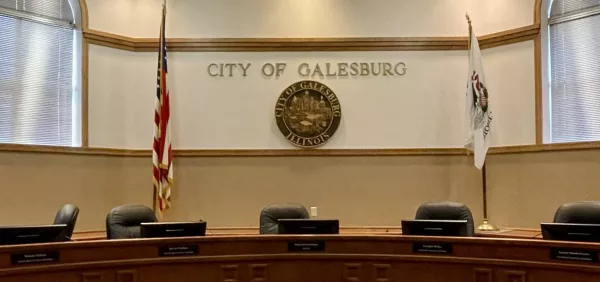The City of Galesburg says it was justified to conduct a recent closed session meeting in order to discuss a federal discrimination complaint against the city. The defense from city legal counsel comes in light of two Galesburg alderman accusing the City Council of violating the Illinois Open Meetings Act at the Dec. 5 and 19 executive sessions.
Ward 1 Alderman Bradley Hix and Ward 7 Alderman Larry Cox filed Open Meetings Act violations complaints on Jan. 11 and 13 against Galesburg Mayor Peter Schwartzman and City Manager Gerald Smith. The two council members singled out the mayor and city manager, saying the alleged violations involved the creating of a new city position and salary increases.
Drew Hill, deputy press secretary for the Illinois Attorney General offices, confirmed the Galesburg City Council is being investigated as a body and not as individuals in the case, citing the language of the Act “imposes legal responsibilities on public bodies.” Hix and Cox were present for both the Dec. 5 and 19 meetings.
Among the items in question from the Dec. 5, 2022, executive session was Smith seeking council approval to advertise for a new position of assistant city manager/director of public works.
The exemption used by the City Council to moved into closed session was 5 ILCS 120/2 (c)(1): The appointment, employment, compensation, discipline, performance, or dismissal of specific employees.
City attorney Paul Mangieri filed the city’s required response, dated Jan. 30, to the Illinois AG Public Assess Bureau and said the city was justified to move into executive session on Dec. 5. This week, the Public Access Bureau provided WGIL with the letter containing the city’s response.
City: Racial, sexual discrimination among allegations in EEOC complaint
In it, Mangieri writes, “A review of the minutes of that session would establish that the reason for the closed session was to address potential response to an active EEOC complaint against the city,” Mangieri said in the letter. “Some of the allegations of the EEOC complaint include allegations of racial and sexual discrimination and an overall hostile work environment.”
The city response notes the EEOC may require an offending party to take steps to remediate systemic discrimination, so as to avoid future discrimination. One such remedy that has long been identified is that of recruitment and hiring of qualified minority applicants in supervisory roles.
Mangieri said Smith asked for the closed session meeting under the backdrop of potential remedies for the city should the EEOC find evidence of discrimination in its investigation.
While executive sessions are intended to be closed to the public and the media, the city inadvertently live internet-streamed the first 25 minutes of the closed session on Dec. 5. WGIL Radio automatically records the live streams of council meetings and has retained the audio portion of the meeting. The audio could be heard by anyone listening live to the internet stream that night.
Smith did not attend the Dec. 5 meeting in person, but participated remotely and said that he was seeking the council’s approval to create the new position of assistant city manager/director of public works for the sole intent of seeking a qualified minority applicant.
During the executive session, Smith repeatedly referred to the fact the city of Galesburg was facing EEOC complaints from a former employee. Neither the complainant’s name nor position were identified, nor was the nature of the complaint.
With the city facing EEOC complaints, Smith told council members and the mayor that he felt it was important to introduce diversity into the management level of Galesburg city government.
Galesburg alderman can reply to city’s response
Hill told WGIL on Friday that the city’s response has been sent to the individuals who filed the requests for review — Hix and Cox — who will have an opportunity to reply. The Public Access Bureau will then review all the materials submitted by the parties.
“While we work to resolve matters as efficiently as possible, we prioritize evaluating matters as thoroughly as possible,” Hill said.
Hill said he is unable to provide an average time for resolving requests for review as timing depends on factors such as the complexity of legal issues presented and volume of materials to be reviewed.
City of Galesburg response to Illinois Attorney General by WGIL Radio on Scribd







